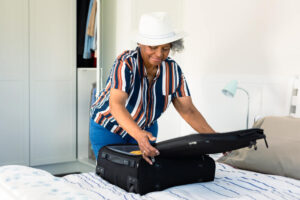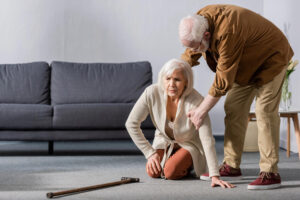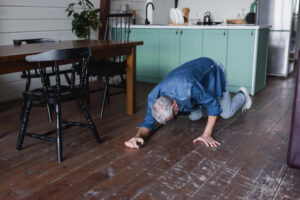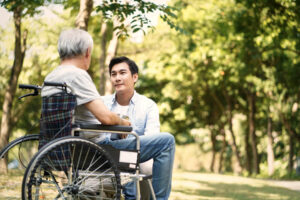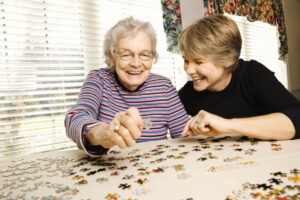The month of June is Pride Month across America. We are honored to recognize the thousands of people in the LGBTQ community, especially our seniors, who have worked tirelessly to gain rights, change laws, and increase social acceptance.
Every person deserves to grow older with dignity; this is especially true for LGBTQ seniors who have had to fight their entire lives to receive equality. Many LGBTQ older adults have faced a lifetime of discrimination and find it difficult to find a supportive environment to spend their later years.
In fact, many feel the need to hide their sexual orientation to receive fair medical care as they get older. At Elder Care Alliance, we work diligently to create a supportive environment for whole-person wellness. We believe all LGBTQ seniors should be able to live at the highest level of independence, with dignity and enjoyment. One of the greatest ways to honor our LGBTQ older adults is to educate and develop an understanding of LGBTQ history.
LGBTQ History

LGBTQ rights have been hard-won, and they continue to be a social and legal battle. The rights and acceptance that many LGBTQ individuals have today came from LGBTQ seniors who risked their lives, livelihoods, and reputations to advocate for equality in the American legal system and society as a whole. To understand what many LGBTQ seniors experienced, it is important to understand some recent history that has dramatically changed the landscape of society’s rejection of the LGBTQ community. There are key events worth studying in-depth to understand the culture and history of any LGBTQ senior.
- In 1924, Henry Gerber established the first gay rights group in the United States, the Society for Human Rights.
- In 1950, The Mattachine Society was founded by activist Harry Hay. It was one of the first gay rights groups in the US to focus on social acceptance and other forms of support for the homosexual community.
- On April 27, 1953, President Eisenhower signed an executive order banning homosexuals from working in the federal government, citing security risks.
- In September of 1955, The Daughters of Bilitis (DOB) forms in San Francisco as the first known lesbian rights organization in the US.
- In July of 1961, Illinois repeals its sodomy laws becoming the first state to decriminalize homosexuality.
- In September of 1961, a local station in California airs the first US-televised documentary about homosexuality.
- On June 28, 1969, the Stonewall Inn in New York City was raided by police, sparking protests and demonstrations. This would later be recognized as the impetus for the gay civil rights movement in the US.
- A year later, on June 28, 1970, people marched through the local streets in New York City to commemorate the one-year anniversary of the Stonewall riots. This is now considered the first gay pride parade and is named Christopher Street Liberation Day.
- On January 1, 1973, Maryland became the first state to ban same-sex marriage.
- At the end of 1973, on December 15th, the American Psychiatric Association removes homosexuality as a mental disorder in their diagnostic manual by a vote of 5,854 to 3,810.
- On January 9, 1978, Harvey Milk, an openly gay man, was inaugurated as San Francisco city supervisor, the first to be elected to political office in California. In November, he was murdered along with Mayor George Moscone.
- In March of 1982, Wisconsin became the first state to make it illegal to discriminate based on sexual orientation.
- On September 21, 1996, President Clinton signed legislation defining marriage as “a legal union between one man and one woman as husband and wife” called the Defense of Marriage Act or DOMA.
- A few months later, on December 3, 1996, Judge Change of Hawaii ruled that the state does not have the right to keep same-sex couples from marrying. Hawaii becomes the first state to acknowledge that lesbian and gay couples should have the same rights as heterosexual married couples.
- In 2004, Massachusetts was the first state to legalize same-sex marriage
- On May 15, 2008, the California Supreme Court ruled that limiting marriage to heterosexuality is unconstitutional.
- On June 26, 2015, the Supreme Court ruled that states cannot ban same-sex marriage.
- In September 2017, California passed SB219, a bill of rights for LGBTQ seniors in long-term care facilities to protect elderly LGBTQ individuals from mistreatment.
- In November of 2017, Virginia elects the state’s first openly transgender candidate, Danica Roem, to the Virginia House of Delegates. She becomes the first openly transgender elected official to a state legislature in US history.
- On June 15, 2020, the Supreme Court ruled in favor of federal laws protecting LGBTQ workers from discrimination.
History continues to be made for LGBTQ communities. Many older adults lived this history, and their communities of care should be able to create dialogue, celebration, and engagement over the hard-won paths towards equality.
LGBTQ Senior Wellness Care
It is estimated that there are 3 million (perhaps even more) LGBTQ people aged 55 and older; these estimates will rise to nearly 7 million by the year 2030. At Elder Care Alliance, we believe that outstanding care covers all dimensions of wellness in support of a full life. While many LGBTQ seniors worry about inequality or discrimination in a senior living community, we work hard to create an inclusive, safe environment for all of our members. We’re dedicated to meeting the physical, emotional, and spiritual needs of all residents, no matter their beliefs:
- Physical — Maintaining a healthy diet, sleeping well, and remaining active.
- Emotional — Understanding oneself and fostering healthy relationships that empower us to deal with life’s challenges.
- Intellectual — Maintaining creativity, being open to new ideas, and continuing to learn.
- Social — Creating and maintaining meaningful personal connections, a sense of belonging, and a well-established support system.
- Vocational — Putting unique talents and passions to work in maintaining a sense of purpose and accomplishing new goals.
- Environmental — Living in harmony with the environment, having a conscious relationship with the surrounding world, and creating positive environments.
- Spiritual — Finding alignment between our values and actions, connecting to our purpose, and finding meaning in life.
We believe there are unique challenges for people who identify as LGBTQ and we continue to identify LGBT-inclusive strategies in our five communities. Our mission is centered around the care of seniors — putting their well-being and dignity at the forefront of all we do.
















